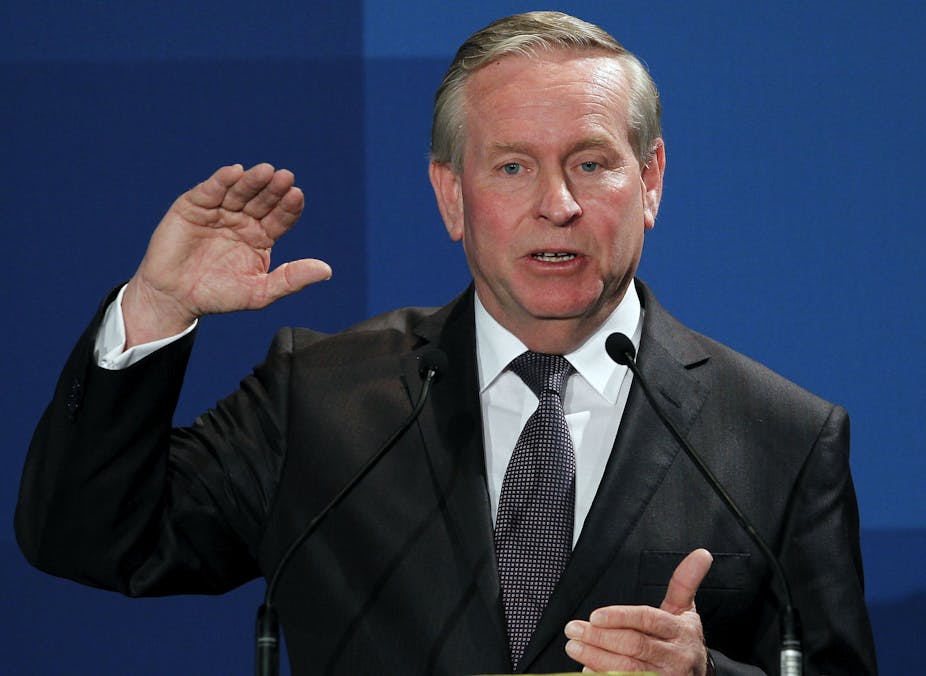2013 hasn’t been a good year for Western Australian premier Colin Barnett. Standard and Poor’s recent downgrade of his government’s credit rating continues a pattern. It is not an aberration.
Barnett’s repeated calls in recent days for an increase in the Goods and Services Tax (GST) were promptly quashed by a spokesman for prime minister Tony Abbott.
There will be no change to the GST, full stop, end of story.
And let’s be clear about this: at no stage during the recent federal election did Tony Abbott suggest that the system for distributing GST funding would be revised to ensure that WA got a bigger share of GST revenues. So anyone expecting that the problem will be fixed through increased GST funding is fooling themselves.
The downgrade is undoubtedly the worst of the calamities that have befallen Barnett’s government, not just because it points to ongoing problems for the state’s finances. This is not just about the extra A$20 million a year it will cost to raise money. It is about declining revenues from mining royalties and ongoing problems with meeting the infrastructure needs of a growing population.
The most troubling aspect of Standard and Poor’s downgrading for Barnett, though, is that it was based on the view that he and his government had limited political will when it came to returning the budget to surplus. This undoubtedly reflects the fact that Barnett had to reverse two measures that would have saved over $170 million in this year’s budget.
The more embarrassing reversal involved not retrospectively cutting rebates to solar power users who returned energy to the grid. Reducing rebates that induced people to install systems after the event just seemed wrong to everyone.
The more interesting aspect of the downgrading is that it reveals Barnett’s deep inconsistency. On one hand, he promotes his government as a sound economic manager. This means they balance their budgets. He has even said that he will not preside over a government that delivers a deficit budget.
On the other hand, Barnett promotes his government (and particularly himself) as a champion of development. This requires government investment in infrastructure. When your revenues are falling, that means going into deficit.
Standard and Poor have not revealed some minor problem. They have pointed to a continuing headache for Barnett, and for Abbott, as Barnett will have to blame someone else for the problems.
If only it wasn’t just another in a series of problems Barnett has had to face this year. The year started quite well for Colin Barnett. He led the Coalition to a decisive election win. The Liberals even won enough seats to govern in their own right, though they were never going to do so. But the win wasn’t as big as it might have been. I was amongst those who thought that this was a result of Barnett’s lacklustre performance during the election. Journalists were even calling his office to see whether he was sick.
Barnett had only been in office a month when Woodside decided not to go ahead with a gas processing hub at James Price Point. Barnett had pushed very hard for this development. It deeply - perhaps permanently - divided the local community and offended environmentalists around the state.
Barnett accused Woodside of letting people down, though Woodside had never formally committed to developing the site. It was for Barnett and not for Woodside that the project had to go ahead. The project’s demise was not a good “look” for champions of development.
Then the Oakajee Port development was suspended in June. This was mainly a private development, but the government had invested plenty in it, both in money and reputation.
After that, the Barnett government had to admit that it had wasted over $250 million trying to rejuvenate the Muja power station near Collie in southwest Western Australia. It turns out that corrosion in the piping has always been so bad that the station will never operate at full capacity.
Barnett remains secure, but mostly because he lacks legitimate challengers within the Liberal Party. Christian Porter’s move into the federal sphere took Barnett’s obvious successor out of state politics. Kim Hames is deputy premier and an obvious contender. The fallout from his resignation as tourism minister - due to (minor) problems with his claims for ministerial travel allowances - is yet to clear, though. The time may even come when Troy Buswell stops ruling himself out as a potential leader of the party.
Few people will be cheering louder for Fremantle in this weekend’s AFL Grand Final than Colin Barnett. Not because he is a dyed-in-the-wool Freo supporter (he seems more of an Eagles fan to me), but because he needs something to go his way in Western Australia.

